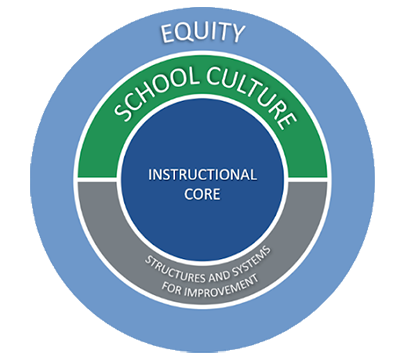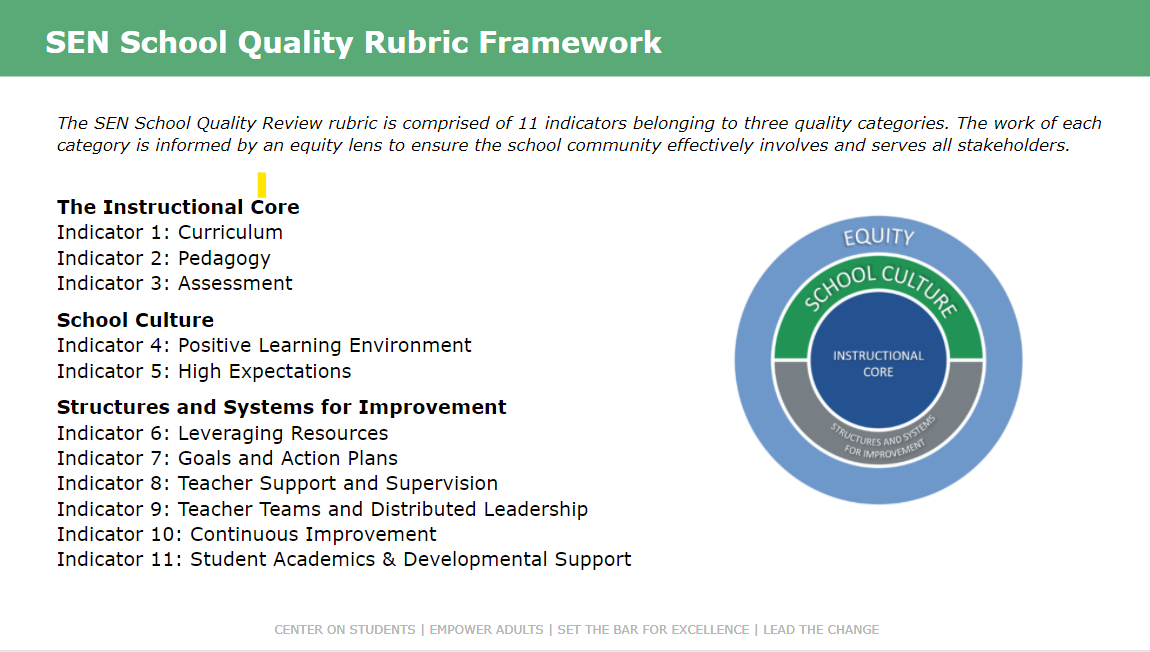SCHOOL QUALITY REVIEWS
SEN’s School Quality Review services provide local education agencies with a clear, rigorous, and research-based picture of their schools’ academic, cultural, and operational health. As both formative and summative tools, SQRs position school systems for successful school improvement initiatives.
WHY SCHOOL QUALITY REVIEWS
Districts and networks use SEN SQRs to establish a roadmap to a shared understanding of school quality within a school building or across a school system and to identify the highest-leverage action steps for putting those schools on track for lasting improvement–both by capitalizing on school strengths and developing action plans for areas of focus. SEN school assessments serve as detailed snapshots of school quality both before and after an intervention takes place. They also provide districts with common language to evaluate schools’ progress.
WHAT SETS SEN APART?
SEN’s SQR process and training programs are designed by the former leader of NYC’s Office of School Quality. SEN’s reviewers are former high-performing school leaders who have led schools in a turnaround context. This firsthand experience uniquely qualifies the SEN review team to deliver accurate ratings and to provide insightful, useful, and prioritized feedback. In addition, SEN offers a suite of workshops focused on specific aspects of its quality rubric for schools or school systems desiring added support with their SQR findings.
SEN APPROACH
At the onset of the SQR process, SEN engages with school district senior leadership to tailor the review to the client’s particular needs. School reviews are comprised of meetings with school leaders, classroom visits, teacher team observations, and focus groups involving key stakeholders (i.e. teachers, parents, students). Each review culminates in a feedback session to highlight rubric-based strengths and areas of focus. Detailed school-level reports with rubric ratings memorialize feedback for school communities. Related district- and network-level Round Ups analyze common themes across SQRs to inform priorities, strategy, and planning across schools.
SEN’s SCHOOL QUALITY REVIEW RUBRIC
The SEN SQR rubric is comprised of 11 indicators associated with three distinct quality categories:
- Instructional Core: Curriculum (1); Pedagogy (2); Assessment (3)
- School Culture: Positive Learning Environment (4); High Expectations (5)
- Structures and Systems for Improvement: Leveraging Resources (6); Goals & Action Plans (7); Teacher Support & Supervision (8); Teacher Teams & Distributed Leadership (9); Continuous Improvement (10); Student Academics & Developmental Support (11)

The indicators of quality for Curriculum, Pedagogy, and Assessment are grounded in the theory of action that student learning improves when the relationship between student, teacher, and content–collectively, the instructional core–is improved. The theory of action extends to include the idea that efforts to improve the instructional core are either supported or hindered by the quality of school culture, structures, and systems for improvement. The work belonging to each category is informed by an equity lens to ensure the school community effectively involves and serves all stakeholders.
CORE DOCUMENTS
SEN SRQ RUBRIC OVERVIEW
Instructional Core |
||
|
Indicator 1: Curriculum Rigorous, engaging, and coherent curricula
|
Indicator 2: Pedagogy Effective instruction that yields high quality student work |
Indicator 3: Assessment Curricula-aligned assessments that inform instruction |
| a. Curriculum aligns to appropriate frameworks and standards | a. Shared beliefs informed by a research-based framework | a. Curricula-aligned assessment practices that provide actionable feedback |
| b. Rigorous tasks and higher order skills for all | b. Teaching strategies provide multiple entry points for all | b. Common assessment analysis that drives adjustments and support |
| c. Planning and revising to ensure access to curricula and cognitive engagement for all | c. High levels of student participation and meaningful work products/discussion | c. Effective checks for understanding used for live adjustments |
School Culture |
|
|
Indicator 4: Positive Learning Environment Clear philosophy and intentional structures for a positive, equitable school culture |
Indicator 5: High Expectations A culture of learning that includes high expectations and strong support |
| a. Safe, equitable, and inclusive school culture | a. Communication of and accountability to high expectations for staff |
| b. Structures for coordination of social-emotional learning and supports | b. Partnerships with families to support high expectations |
| c. Opportunities for learning aligned to desired school culture | c. Systems to communicate and support high expectations for students |
Systems and Structures for Improvement |
||
|
Indicator 6: Leveraging Resources
Clear alignment and intention between resource allocation and school mission, vision, goals |
Indicator 7: Goals and Action Plans
School-level theory of action that includes equity drives shared goals for school improvement |
Indicator 8: Teacher Support and Supervision Effective systems development and evaluation of teachers
|
| a. Resources equitably and strategically aligned to goals | a. Goals are developed from a clear TOA and tracked for progress | a. Teacher growth supported by effective cycle of observation and feedback |
| b. Schedule and human resources are organized to impact goals | b. Data assessment and ongoing analysis drives goals, action plans, and PD | b. Effective and accurate feedback with clear next steps |
| c. Strategic hiring, programming (teacher and student) and interventions aligned to needs | c. Community involvement in and ownership of goals | c. Data-informed professional development and hiring, placement, promotion decisions |
|
Indicator 9: Teacher Teams and Distributed Leadership Leveraging professional collaborations to improve outcomes |
Indicator 10: Continuous Improvement Effective structures for regular evaluation of school-level decisions |
Indicator 11: Student Academics & Developmental Support Effective systems to monitor and accelerate student growth |
| a. Clear vision for teacher teaming structures that includes collaboration, use of data, and alignment with school goals | a. Evaluating and adjusting curricular and instructional practices based on student needs to elevate impact | a. Effective approach to academic and developmental support that is informed by an equity lens and is culturally and linguistically responsive |
| b. The analysis of student work and assessment data occurs regularly, with purpose, and impacts student outcomes | b. Evaluating quality of school culture and expectations to make adjustments to elevate impact | b. Effective multi-tiered system of instruction and interventions designed to prevent failure and/or accelerate learning. |
| c. Embedded distributed leadership structures that influence key decisions | c. Evaluating and adjusting use of resources, teacher team effectiveness, and professional development to elevate impact | c. Effective process for teacher teams to assess students’ performance in interventions. |

